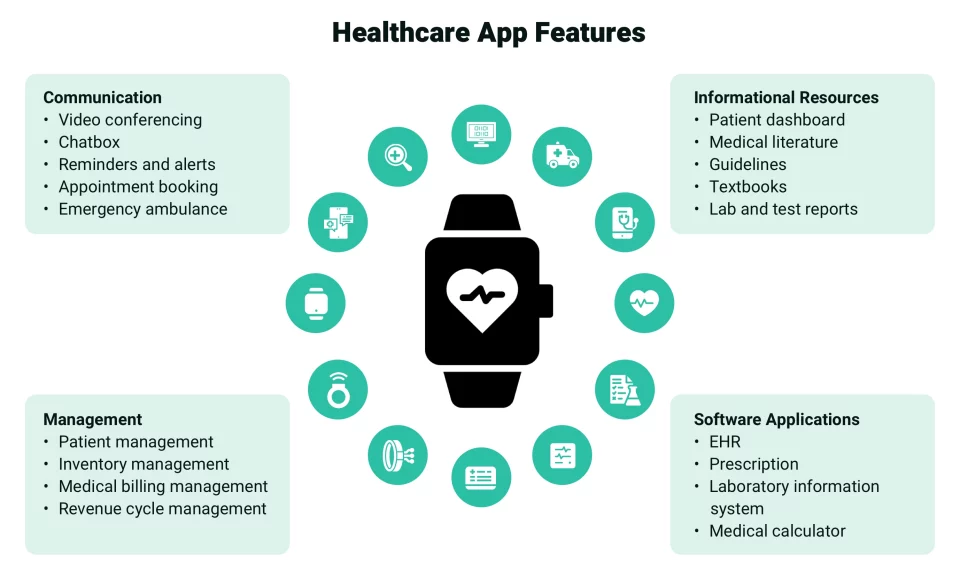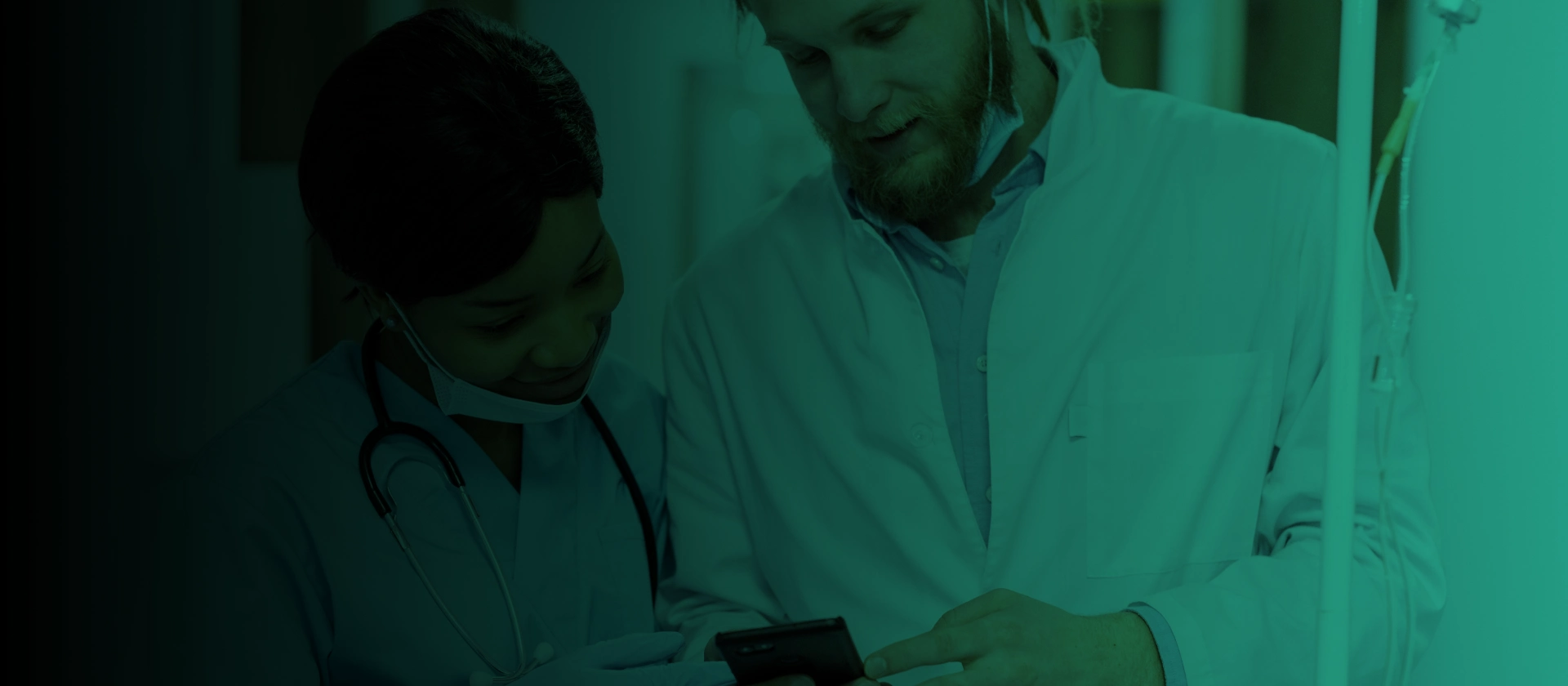INTRODUCTION
Defining the role of patient-centricity in mobile app development
In today's fast-paced healthcare landscape, the demand for personalized care has reached an all-time high, prompting a revolution in how we interact with medical services. Often overlooked but immensely powerful, mobile apps have emerged as modest pioneers in the ongoing digital transformation of the healthcare industry. Mobile apps are digital tools that serve as the conduit between patients and providers, facilitating seamless communication and efficient management of health records and remote consultations. As technology takes center stage in our lives, the healthcare landscape is buzzing with innovation, and patient-centric mobile app development for healthcare stands at the forefront of this revolution.
But why should you care? Well, imagine having your entire medical history, appointment scheduling, and even remote consultations right in the palm of your hand. Imagine a world where healthcare is mirrored to fit your unique needs, and every touchpoint is carefully crafted with your well-being in mind. This is where Asahi Technologies steps in – reimagining healthcare software development to incorporate a new level of control and engagement for patients and providers alike.
In this explosive era of digital health software development, curiosity drives us toward a future where healthcare is seamlessly accessible at our fingertips. We understand this dynamic mix of innovation and necessity and dedicate ourselves to crafting solutions that meet and exceed modern healthcare consumers' expectations.
As the demand for personalized services continues to surge, mobile apps stand as steadfast allies, driving us toward a future where healthcare is not just reactive but proactive and deeply tailored to individual needs. Behind the scenes, our team is working tirelessly to redefine the landscape of healthcare software development. We do not just create apps; we engineer solutions that dramatically reduce costs, streamline processes, and ultimately enhance patient engagement and care.
But here's the kicker: Asahi’s not just talking the talk; we are walking the walk. Our expertise in healthcare software development isn't just a claim; it's a commitment. So, are you ready to dive deeper into patient-centric mobile app development? Because we're just getting started.
APPROACH
Forging solid patient-provider relationships by taking a patient-centric approach
The need to take a holistic approach to patient-centricity is at the core of mobile app development. This approach acts as the guiding star, illuminating the path toward creating apps that meet and anticipate users' needs. But what exactly does it mean to prioritize patients in the digital realm?
Imagine your app as a trusted health companion seamlessly integrated into users' daily lives. It's not just about delivering information; it's about serving it up in bite-sized, easily digestible pieces of content that feel like a warm hug in a complex digital landscape. This approach goes beyond mere functionality—it's about crafting an experience that feels intuitive, stress-free, and soothing.
So, what are the benefits of designing apps with this patient-centric facet? Well, for starters, it's all about engagement. You evoke a sense of connection and empowerment by nudging users at the right time with personalized reminders or insights tailored to their specific health goals. It's like having a gentle whisper guiding you toward better health.
But it's not just about engagement; it's also about accessibility. A patient-centered software is designed to cater to a spectrum of abilities, ensuring everyone can easily navigate it, regardless of technological prowess or physical limitations. It's about creating a clutter-free environment where information flows seamlessly, empowering users to take control of their health journey.
Now, you might be wondering why patient-centricity is so crucial in modern healthcare. Well, think about it this way: patients crave simplicity and clarity in a world where information overload is the norm. By crystallizing complex medical concepts into user-friendly interfaces and intuitive design principles, you empower individuals to make informed decisions about their health in a natural and empowering way.
So, how do you start your patient-centric journey? It begins with empathy - a deep understanding of your target audience's needs, preferences, and pain points. Ask yourself: What challenges do they face? What solutions can your app offer to make their lives easier? Putting yourself in their shoes lays the foundation for a truly transformative app that meets and exceeds their expectations.
In patient-centric mobile app development, every micro-moment counts. It's about creating an experience that meets users' needs and leaves a lasting impression that resonates long after they've closed the app.
Adopting a patient-centric approach in healthcare mobile app development requires careful planning, attention to detail, and a deep understanding of the needs and preferences of the end-users. Let's break down the process we follow during custom healthcare app development into actionable steps:
- Defining a robust strategy - We dive deep into your query to understand your motive for developing a mobile application. At this stage, we ask questions and demand app-relevant answers to devise a foolproof strategy.
- Researching - We conduct thorough research to understand the behaviors and aspirations of the target audience. One way to do this is by engaging the audience in surveys that offer valuable insights that improve your app’s design and functionality.
- Sorting out the hardware requirements - We ensure your mobile app works on all existing platforms to prevent patients from experiencing inconvenience. We implement APIs that facilitate communication and data exchange between the app and different hardware components, ensuring interoperability.
- Building a responsive design - We harness user-centered design principles to create an app interface that is intuitive, accessible, and user-friendly. Our team prioritizes
healthcare UI-UX design services that exemplify simplicity, clarity, and consistency in navigation, layout, and interaction design. - Ensuring data security - We implement robust encryption methods to prevent data breaches and build an impenetrable fortress as a mobile application. We build HIPAA compliant software to protect sensitive medical information.
- Iterative testing and feedback - We conduct iterative testing with real users to gather feedback on an application’s usability, functionality, and overall user experience. We iterate on your designs based on user insights to ensure that the final product meets users’ needs and expectations.
KEY FEATURES
Highlighting the key features of patient-centric mobile app development and understanding their impact on patient experiences
The best mobile healthcare apps are integrated with the most valuable features to facilitate patient-centricity. Incorporating features like appointment scheduling, EHR, patient management, billing cycles, reminders, and video chat, among many others, proves to be a game-changer in enhancing the efficiency of the healthcare ecosystem. Moreover, your specific healthcare app can appeal to the patients' choices and requirements and improve the reputation of your healthcare organization.
We have divided the key features of healthcare mobile app development into four categories that best describe their functionalities and purposes within the app ecosystem.
Communication
A mobile healthcare application must have inbuilt communication features that dictate how patients and providers interact within the given framework. Healthcare mobile app development must create seamless interaction channels to bridge the gap between healthcare providers and patients. Strong communication channels stand for solid doctor-patient relationships, which are the key to better patient outcomes. Here are the must-have communication features of a mobile application:
- Video conferencing
- Chatbox
- Reminders and alerts
- Appointment booking
- Emergency ambulance
Management
Efficient management lies at the heart of a thriving healthcare ecosystem. Custom healthcare app development can take you one step closer to proper management. A successful healthcare mobile app encompasses robust management features that help healthcare providers offer better-quality patient care while effectively managing hospital resources. Integrating management features into healthcare mobile apps streamlines the administrative processes and enables healthcare providers to focus more on patient healthcare delivery. We have listed the essential management features of a healthcare mobile application:
- Patient management - health monitoring
- Pharmacy inventory management
- Medical billing management
- Revenue cycle management
- Payment gateway
Informational resources
Access to reliable and up-to-date information is crucial for patients and healthcare professionals. Healthcare mobile apps serve as valuable repositories of informational resources, providing access to medical literature, guidelines, textbooks, and pertinent healthcare information. By offering comprehensive and accurate information, these apps empower users to make informed decisions about their health and treatment options. Every mobile healthcare application should have the following information resources:
- Patient dashboard
- Medical literature
- Guidelines
- Textbooks
- Lab and test reports
Software applications
The backbone of healthcare mobile apps lies in their diverse software applications tailored to meet specific healthcare needs. From Electronic Health Records (EHR) and e-prescription technologies to disease diagnosis tools and medical calculators, these features equip healthcare professionals with the tools they need to deliver quality care, streamline clinical workflows, and improve patient outcomes. With the integration of innovative software applications, healthcare mobile apps are revolutionizing the delivery of healthcare services, driving efficiency, and enhancing patient care experiences. We have mentioned below the essential software application features a successful mobile app should have:
- EHR
- Prescription
- Laboratory information system
- Medical calculator
- Disease diagnosis and prevention

The key features of patient-centric mobile app development that revolutionize healthcare delivery
Impact of mobile app features on patient outcomes and care coordination
The impact of patient-centric mobile app features on patient outcomes and care coordination is nothing short of revolutionary. With each feature carefully crafted to address specific healthcare needs, these apps are at the forefront of a digital health revolution, transforming how patients engage in their healthcare journey.
When patients can easily access telemedicine services through their smartphones, it's like having a health buddy in their pocket, ready to offer support and guidance whenever needed. This level of connected care enhances convenience and empowers patients to take charge of their health proactively. As patients tick off the checkbox of virtual consultations and health monitoring, they become active participants in their care, improving patient outcomes and overall well-being.
Moreover, the wealth of information available at their fingertips is indeed gold, providing patients with valuable insights into their health conditions and treatment options. From medication reminders to personalized health tips, these apps cater to the discerning patient, offering credible resources to aid the patient’s healthcare journey.
Furthermore, mobile app features play a fundamental role in care coordination, allowing healthcare providers to peek into patients' health data in real time and make informed decisions collaboratively. This seamless exchange of information alleviates communication barriers and ensures patients receive timely and effective care across the healthcare continuum.
OVERCOMING CHALLENGES
Learning how Asahi Technologies overcomes challenges in the road of patient-centric mobile app development
Navigating the intricate terrain of healthcare mobile app development is akin to embarking on a thrilling adventure through uncharted territories. Every twist and turn presents a new challenge, a fresh opportunity to showcase innovation and resilience. In this digital age where the demand for seamless, patient-centric solutions is at its peak, developers find themselves at the crossroads of innovation and necessity, balancing the needs of functionality, security, and user experience. Thankfully, in the face of adversity lies the seed of opportunity.
As we embark on this exhilarating journey of patient-centric healthcare app development, we must overcome many challenges - ranging from stringent regulatory requirements to the complexities of interoperability and data security. Yet, these challenges serve as the catalysts for innovation, pushing us to think outside the box and redefine the boundaries of what's possible in healthcare technology. Let us understand the many challenges underlining the art of custom healthcare development and identify solutions to aid better health outcomes.
Data security
A person’s medical information is as private to him/her as a classified project file is to the Government.
Data security is one of the significant challenges faced by any healthcare software development company. Healthcare mobile apps store tremendous amounts of sensitive personal and medical data. These apps must easily handle device vulnerabilities to prevent data breaches or leaks. Any crack in storing patients' confidential information can cause irreversible damage to the person's dignity and the healthcare organization's reputation. Therefore, one must deal with data privacy concerns first during mobile app development.
How Asahi Technologies overcomes data security challenges
At Asahi Technologies, safeguarding the privacy and confidentiality of patient data is not just a priority—it's a fundamental principle ingrained in every aspect of our development process. We approach data security with utmost diligence and commitment. Our team of expert developers meticulously assesses and addresses potential vulnerabilities in healthcare mobile apps, implementing robust encryption methods and authentication protocols to fortify the storage and transmission of sensitive personal and medical data.
Moreover, we understand that data security is not a one-time effort but an ongoing endeavor that requires constant vigilance and adaptation. We stay abreast of the latest advancements in cybersecurity and regulatory requirements, ensuring that our solutions adhere to the highest data protection standards. Our unwavering commitment to data security instills trust and confidence in users and reinforces our reputation as a reliable and trustworthy partner in patient-centric healthcare software development.
Regulatory compliance
Regulatory compliance is like a compass guiding developers through the maze of legal and ethical considerations. Ensuring regulatory compliance is about building a fortress of trust around patient data; it is about striking a balance between pushing the boundaries of technology and adhering to stringent regulatory standards.
In the digital age, where data breaches make headlines and privacy concerns loom large, regulatory compliance serves as the bedrock upon which the integrity and credibility of healthcare web apps are built.
How Asahi Technologies addresses regulatory compliance issues
At Asahi Technologies, we approach regulatory compliance with meticulous attention to detail, recognizing its pivotal role in shaping the integrity and credibility of our healthcare web apps. With the Health Insurance Portability and Accountability Act (HIPAA) standing as a cornerstone of patient data protection, we ensure that every aspect of our development process aligns with its stringent requirements. Our team of experts undergoes rigorous training to understand the intricacies of HIPAA regulations, enabling us to navigate the complex landscape of healthcare compliance with confidence and precision.
We go beyond mere adherence to regulatory standards and proactively integrate HIPAA-compliant practices into every development phase. From robust data encryption and authentication protocols to stringent access controls and audit trails, we implement state-of-the-art security measures to safeguard patient data against unauthorized access or breaches.
Health awareness and literacy
One of the most pressing challenges in healthcare mobile app development is fostering health awareness and literacy among users. Despite the abundance of information available at our fingertips, navigating the convolutions of health-related topics remains daunting for many. As developers, we face the uphill battle of distilling vast medical knowledge into digestible, actionable insights that resonate with diverse audiences.
How Asahi Technologies overcomes health awareness challenges
In an era where Dr. Google reigns supreme in gathering healthcare knowledge, Asahi Technologies rises to the occasion, delivering solutions that provide reliable information and cultivate a culture of health literacy among users, transforming passive consumers into proactive participants in their well-being. From personalized health tips to interactive educational modules, we leverage technology to bridge the gap between information and action.
We collaborate closely with healthcare professionals and subject matter experts to ensure the accuracy and credibility of the health information provided in our apps. By curating evidence-based content and adhering to industry best practices, we instill trust and confidence in our users, empowering them to make informed decisions about their health.
Interoperability issues
It is vital to navigate interoperability issues with precision and ingenuity. The fragmented nature of healthcare data hinders the free flow of information between healthcare providers, leading to inefficiencies in care delivery and gaps in patient information. Interoperability issues are compounded by the diverse array of stakeholders in healthcare, each with their unique requirements and priorities. The rapidly evolving healthcare technology services landscape introduces additional complexities, as new innovations and advancements must be integrated into existing systems while maintaining compatibility with legacy infrastructure.
How Asahi Technologies overcomes interoperability issues
From electronic health record (EHR) systems to medical devices and telehealth platforms, we achieve seamless interoperability across these various components by taking a comprehensive approach that considers all stakeholders' needs. We collaborate closely with healthcare stakeholders, including providers, IT vendors, and regulatory bodies. By engaging in ongoing dialogue and partnership, we gain valuable insights into different stakeholders' unique interoperability needs and priorities, allowing us to tailor our solutions accordingly.
We leverage the latest interoperable technologies and standards advancements to ensure seamless data exchange between disparate systems and platforms. Additionally, we recognize the importance of flexibility and scalability in addressing interoperability challenges. Our agile and iterative development process allows us to quickly adapt to changing requirements and integrate new technologies as they emerge. We also prioritize user-centric design principles to enhance the usability and accessibility of our healthcare web apps.
FUTURE ASPECTS
Discussing the emerging technologies that will dictate the growth of patient-centric mobile app development
The future holds a wealth of promise and potential in patient-centric mobile app development, with emerging trends poised to reshape the landscape of healthcare delivery. As we unpack the realities of tomorrow, it becomes increasingly clear that technologies such as artificial intelligence (AI) and Internet of Things (IoT) integration will play pivotal roles in driving innovation and enhancing patient engagement and care.
With its ability to analyze vast amounts of data and glean actionable insights, AI is the key to unlocking new possibilities in healthcare apps. From personalized treatment recommendations to predictive analytics for early disease detection, AI-powered algorithms have the potential to revolutionize the way healthcare is delivered. Similarly, IoT integration enables seamless synchronization between wearable devices, medical sensors, and mobile apps. It empowers patients to monitor their health in real time and share vital data with healthcare providers safely and swiftly.
We are at the forefront of these industry advancements, positioning ourselves as an innovative partner driving the future of patient-centric mobile app development. Our novel approach melds cutting-edge technologies with ethically sourced data and user-centric design principles to create solutions that resonate with users and deliver tangible benefits. By venturing into new frontiers and pushing the boundaries of what's possible, we are gauging the pulse of emerging trends and shaping the future of patient-centric healthcare apps.
Our commitment to innovation extends beyond mere technological advancements; we cultivate a thriving community of users and stakeholders who benefit from our solutions. Our industry footprint is characterized by a dedication to excellence, a passion for ethical practices, and a relentless pursuit of better health outcomes for all. As we embark on this journey towards a future where healthcare apps empower and inspire, we stand as a growth champion, driving positive change and transforming how we engage with healthcare.
FINAL WORD
Let’s recap the features, benefits, importance, and impact of patient-centric mobile app development
Patient-centric mobile app development represents a substantial step forward in healthcare delivery, offering a rewarding undertaking that places patients at the forefront of their care journey. By adopting this critical approach, healthcare providers and developers can harness the power of technology to enhance patient engagement and improve health outcomes. Patient-centeredness, once considered a lofty ideal, has become a tangible reality, thanks to the proliferation of high-quality mobile apps that prioritize user experience and empowerment.
As we reflect on the transformative impact of patient-centric mobile app development, it becomes evident that these innovative solutions have the strength to revolutionize how we engage with healthcare. By shedding light on the importance of self-management and proactive healthcare decision-making, these apps empower patients to take control of their health and well-being. With steadfast commitment and unwavering dedication, we can build upon the strengths of patient-centric mobile app development to create a future where everyone has the tools and resources they need to lead healthier, happier lives.
People Also Ask (PAA) questions:
- What are the benefits of patient-centric mobile apps?
Patient-centric mobile apps offer numerous benefits, primarily centered on empowering patients and enhancing their healthcare experience. These apps provide convenient access to medical records, appointment scheduling, and health information, fostering better communication between patients and healthcare providers. - How do healthcare apps improve patient engagement?
Healthcare apps bolster patient engagement by offering convenient access to medical information, appointment scheduling, and communication with healthcare providers. These apps empower individuals to take an active role in managing their health through features like personalized health reminders and educational resources. Healthcare apps foster a sense of accountability, leading to better patient outcomes. - What features should a healthcare mobile app include?
A healthcare mobile app should include essential features such as secure access to medical records, appointment scheduling, and communication with healthcare professionals. Integration with wearable devices for tracking health metrics enhances user experience, while medication reminders and personalized health tips promote adherence to treatment plans. - How can mobile apps enhance communication between patients and providers?
Mobile apps facilitate seamless communication between patients and providers through features like secure messaging for appointment scheduling, prescription refills, and general inquiries. Additionally, virtual consultation options enable real-time interaction, fostering a more accessible and personalized healthcare experience. - What are the security considerations for healthcare app development?
Security considerations for healthcare app development include robust encryption protocols to safeguard patient data, adherence to strict regulatory standards such as HIPAA compliance, and implementing secure authentication methods to prevent unauthorized access. Regular security audits and updates are essential to address vulnerabilities and ensure continuous protection of sensitive medical information.






